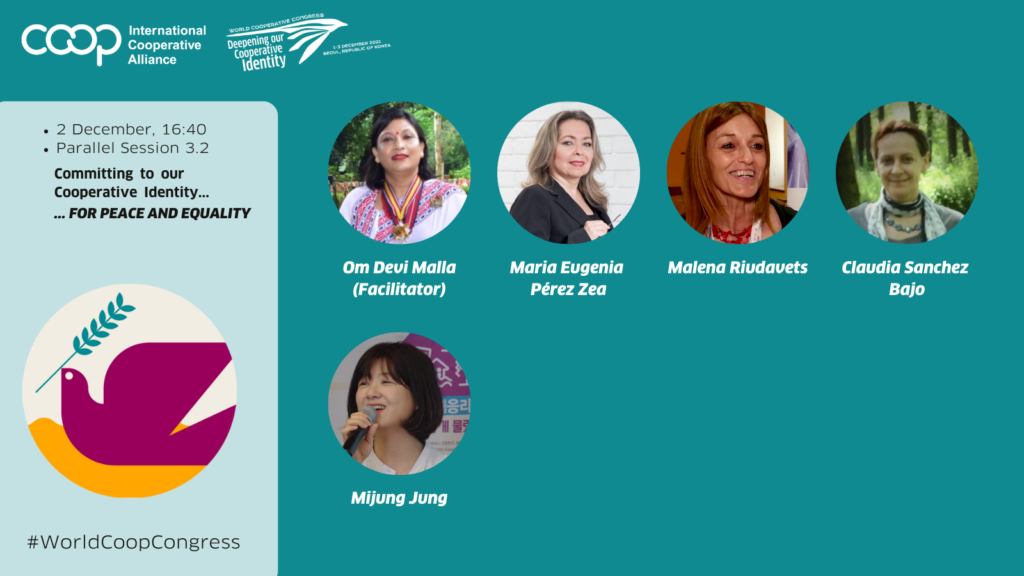
A panel of researchers and co-operators explored how cooperatives are helping to maintain and promote peace, during a Congress parallel session on 2 December.
The session was chaired by Om Devi Malla, Senior Vice Chair of the National Cooperative Federation of Nepal and ICA Board Director (Nepal), who explained that the theme of the session fell in line with SDG16.
Panellists looked at the role of cooperatives in tackling gender-based violence and providing opportunities for women and girls.
Claudia Sanchez Bajo, Researcher, CESOT, Faculty of Economics, University of Buenos Aires, Argentina, explained how the work on cooperatives went beyond acting to benefit their local communities, in line with principle seven.
They can contribute to positive peace and prevent all types of violence in the community, she said, adding: “Peace can also be seen as the pursuit of social justice through equal opportunities, fair distribution of power and material resources and the equal protection of everybody.”
Cooperatives have always been acknowledged by the UN General Assembly as key to peace building.
“Peace, together with development and human rights forms the three pillars of the UN.”
Ms Sanchez Bajo explained that by reducing poverty, cooperatives contributed to increasing equality.
Maria Eugenia Perez, Chair of the ICA Gender Equality Committee, President of ASCOOP and ICA Board Director (Colombia) talked about the impact of conflict on women
Referring to her country’s past armed conflict which lasted over 70 years, she explained that 72% of victims were women, and said that that the role of cooperatives went beyond the fight against war.
“Cooperatives deconstruct structural violence in daily societies,” she said.
She talked about the role of cooperatives in peacebuilding and empowering women by providing jobs, equal economic participation, access to land and leadership opportunities.
As people-centred organisations, cooperatives develop and prioritise human development, help to promote employment and resilience, promote dignified work and offer training, she said.
Delegates also heard from Mijung Jung, chief director of the Asia Pacific Alliance for Disaster Management KOREA (A-PAD KOREA), who talked about how a cooperative movement can strengthen people and communities in times of disaster.
She shared her past experience of losing her home following an earthquake and witnessing the power of cooperatives in all areas of disaster management: mitigation, preparedness, response to emergency situations and recovery.
Self-help and cooperation can help during emergency situations while recovery relies on social support and social participation, which are in line with cooperative principles.
She explained how during the pandemic Korean iCoop started to provide meals for 5,000 disadvantaged children, distributed masks to members and filled in the relief gap.
“That is what self-help is about,” she said.
Cooperatives are also looking at how to tackle climate change. When a forest fire affected one of the nation’s provinces cooperatives provided relief to the affected communities as well as physiological trauma counselling.
“We are moving beyond solidarity towards innovation.”
And following the 2016 earthquake iCoop Korea also created a manual on how to respond to disasters to raise awareness about how to act when such incidents occur.
Malena Riudavets, vice-president of COCETA, Spain, talked about cooperatives fighting against gender-based violence. In Spain each year 50 women die at the hands of their partners. Gender-based violence also exists in the workplace.
“We cannot allow this to continue,” she said. She also shared her experience of being discriminated against in the workplace as a young engineer.
“That’s what cooperatives are here for. We have non-discriminatory selection processes, no salary gaps between men and women, different dynamics that favour gender equality in decision making,” she said.
COCOETA conducted a survey involving 70 cooperatives, which found that many Spanish cooperatives had been running equality plans before this was made mandatory by legislation.
Around 87% had risk prevention plans and 25% had plans against harassment and violence. The survey did not reveal any cases of harassment at work in the cooperatives surveyed.
“The fight against precarious work is also a way to fight gender violence,” she said.
“I teach future electricity installers. They are all men, and I wish that no workmen tell anyone as I was told: ‘Don’t come, ask your father to come’. I try to teach my students that we women can work in any environment without having to be discriminated against just because we are women.”
